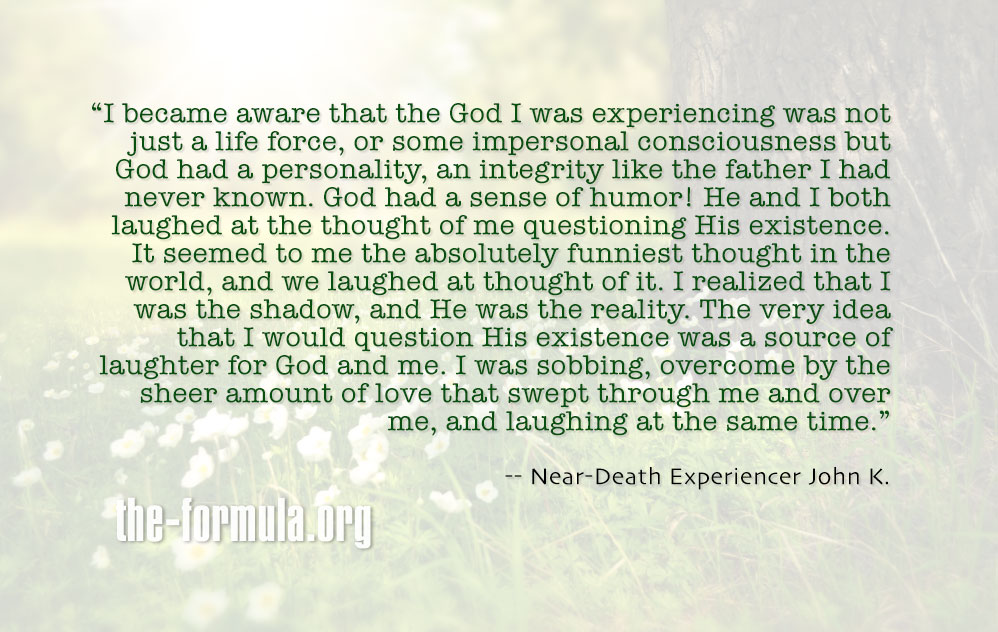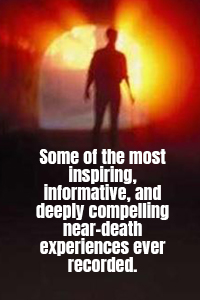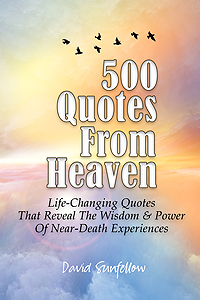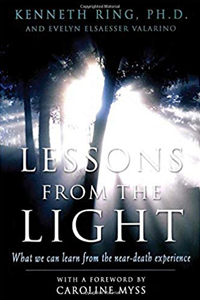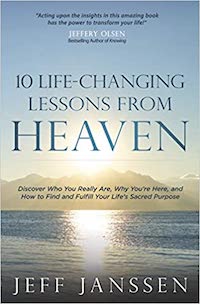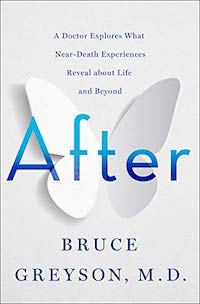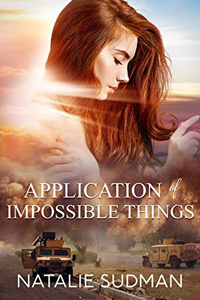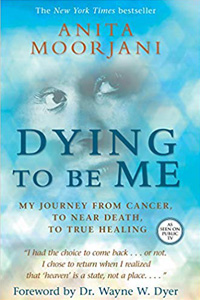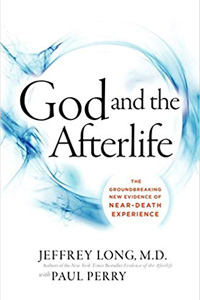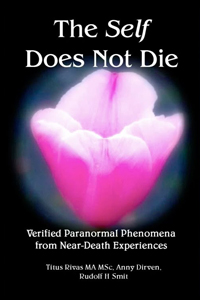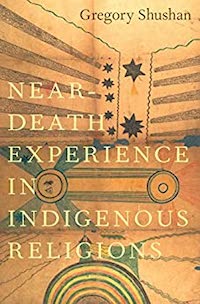![]()
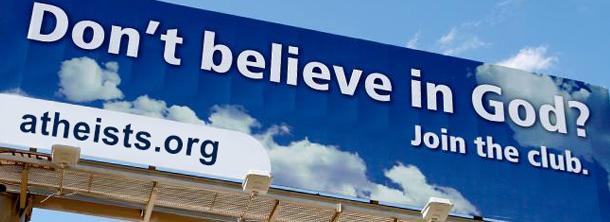
…………..
Near-Death Experiences – Dealing with Skepticism (Panel Discussion)
…………..
How To Deal With Skeptics & Atheists
The following excerpts are taken from a conversation that originally appeared on NHNE’s main NDE social network. Skip to the end of this post to see a list of people who abandoned atheist worldviews after they had a near-death experience.
…
Barbara Harris Whitfield writes:
The problem here is that NDErs “KNOW” God first hand. And Skeptics are basing everything on their stubborn inability to experience another human being’s experience. They can’t get beyond their own voice. The ones I have debated on Oprah, Donahue, Larry King (twice), CNN Medical News, etc., are sad and depressed people who consider themselves “experts” by their own decree. A few atheists like me (before my NDE) have a direct experience of the numinous and then easily “come out” because we get something we never had before called “humility!”
…
David Sunfellow writes:
Barbara, you make an important point. What I’ve noticed, repeatedly, is that when people are “locked” into an atheist mindset, all the evidence in the world doesn’t move them from this position. This page is a good example:
NDEs Absolutely, Positively NOT Caused By Malfunctioning Brains
If you examine the information on this page carefully, the evidence for the existence of consciousness beyond this reality is overwhelming. And it comes from many different places. And yet, I’ve had skeptics look over this page and not be budged an inch by the tsunami of incredible information. Ditto for personal conversations I’ve had with atheists. The best case scenario with such people is that they will agree to disagree, which, in my experience, is also a rare occurrence. They usually feel that they are right and you are sadly, grievously deluded. End of discussion.
All of this leads me to believe that we are primarily dealing with a developmental issue here. And perhaps some deeply entrenched shadow issues. Either the truth can’t be seen because a person hasn’t developed the necessary consciousness to expand beyond materialistic viewpoints, or people are rigidly clinging to atheist viewpoints because they have hidden issues with God, themselves, their parents, or what have you.
Whatever the reasons and motivations are for people to adopt atheist positions, one thing is clear: when atheists encounter the deeper realities of life themselves, either through having an NDE or other kind of spiritually transformative experience, their atheist days are over. You’re a good example of this. Howard Storm is another one. (Many more examples are listed at the end of this discussion.)
Barbara, a quick question. When you debated atheists and skeptics and mentioned that you had been an atheist before your NDE, what did these folks say about that?
…
Barbara Harris Whitfield writes:
The only time having been an atheist before my NDE comes into play is in YouTube titles. Seems I get more views because that is sometimes the headline that the web person puts up. But this idea goes nowhere with atheists or skeptics. Mostly, they show little respect or politeness toward me or other NDErs trying to be understood.
I did a TV show in Toronto as the “expert” with several other NDErs and the skeptic was a magician. I don’t understand at all what kind of credentials being a magician gives someone to debunk a bunch of really nice people who nearly died but that’s what the media does — ridiculous things like that. He wouldn’t stop talking, interrupting and just generally being obnoxious while these people where so vulnerable, trying to express what they experienced. I finally told him (on camera) to stop talking and give the others a chance. The audience went wild applauding and cheering. This is show biz.
You know the Larry King story, introducing me as “Was she out of her body or out of her mind?”
In a church in South Florida, I was lecturing and a man got up and started screaming that I was the work of the devil.
My first husband told one of the participants at the Clinical Approaches for the Near-Death Experience Conference (that I co-chaired) that he didn’t believe I had an NDE but he did believe that I believed I had one! (Try working with that!) That was reported during the conference to Ken Ring, Bruce Greyson and Raymond Moody who then reported it to the group of researchers and clinicians. The conclusion was that we really had our work cut out for us. That was in 1983.
The change that I see now is that we can do a TV show without them bringing in a debunker. They use to promise me there would be no debunker when I would agree to do a TV show, and then bring them on once I was in front of the camera. I have no respect for most of the media — they are interested in ratings — not the truth.
My conclusion (after 30 years of trying) from my family rejection and working with the media is to give up, let the next wave of researchers and experiencers chip away at it. I’ve never changed anyone’s mind once their mind is locked. What we have done is hopefully helped those who have had experiences to believe it themselves. And BTW, many of us quietly, including myself, go through times when even we don’t believe it. We question our sanity. Here’s how I work with my own questions about my sanity. I know my aftereffects. I am totally different then I was before. This is why most of my writing is about the after effects. Didn’t Jesus talk about by their fruits you will know them? Our fruits are profound, unmistakeable and dramatic.
I know how much pain I was in before my NDE. I was a total victim from child abuse and then my first husband took over where my mother left off. I was given the gift of seeing my abuse through the eyes and heart of Something so much greater than anything here in this reality. This incredible Being started me on a journey with so much unbelievable help from “the other side.” Amazing synchronicities that led me to my real self — the me before the abuse — who I would have become without all the abuse. I can remember who I was and how I felt before my NDE and who I am now and that proves to me that something incredible, something out of this world helped me — touched me — Loves me. So the skeptic in me is convinced — but try to convince a hardened, mind-locked (sometimes depressed and wounded) skeptic would probably take them having an experience too because “believing” is just words — “knowing” takes a direct experience.
Having the strength, fortitude and grace (the grace didn’t come from me, it is a gift from God) that it took to get me this far still hasn’t changed some of my adult children’s minds. They are entrenched in their father’s beliefs and can’t see me, the real me — so how can I expect the mind of a skeptic to change.
I’m so sorry if I sound negative. I don’t mean to — but this is my experience.
…
Graham Maxey writes:
One quote I think needs attention here is from Dr. Carl Whitaker, who was, among other things, one of family therapy’s early pioneers. He said, “Part of the problem is the theoretical delusion that science is curative — that enough knowledge, enough information, the right kind of facts will bring about the resolution of life’s doubts, the resolution of all distress.”
People aren’t necessarily swayed by facts or information. They usually have constructed a world of meaning based upon the prejudices that were fed to them, and their own interpretations of their own experiences, which may not include trust, support, encouragement, or love. When something challenges this world of meaning, it is not accepted gladly and with thanks. Too much is at stake. It means that parts of their lives lived under the old meaning would now be meaningless, and that is hard to take from a stranger. There is also often fear of criticism; fear of being ridiculed for changing one’s mind about things. As NDErs often note, not all the people in their lives love to hear about their change. It’s uncomfortable, just as it is for families where an addict suddenly comes full force into recovery.
We can’t even get people to believe the facts when they are in their own long-term interest, like the facts that human beings are changing the world’s climate and initiating many physical and cultural problems that we as yet don’t know how to handle. The facts are there, but changing our behaviors to accommodate them means, to some people, that we will have to give up our privileged place in the world, and that is part of the self-image they rely on.
St. Thomas Aquinas was the champion of reason before the Renaissance. Yet, when he had his supernormal experience (probably an STE) he quit writing and speaking. When asked why, he simply said, “All that I have learned is as straw to me now.” Meaning, he suddenly knew that there was no way to explain what he had experienced, and trying to do that was just hopeless and would come nowhere near the reality that he had been fumbling towards in reason.
I remember hearing Michael Shermer, the skeptics go-to guy on almost any topic, have a debate with Dean Radin and Russel Targ on a radio program. They cleaned his clock. I was almost embarrassed for Shermer, who, as we know, grew up in a fundamentalist religion and finally escaped that knowledge vacuum and left Pepperdine University where he had gone to become a minister. But, getting free of shallow dogma set him up to reject anything that could not be materialistically proven to him. I expected after Radin and Targ finished with him on the air that he would retire in shame. But, he’s still doing the same stuff he always did. He can’t give up decades of his life’s meaning even if he is publicly proven 100% in error.
What’s left then? Well, people aren’t interested in people who have the facts “all together.” They are interested in people who can help them get it together. It’s the manner in which we speak and write, not the subject or the data we produce that help others to grasp even the smallest bit of what is experienced in supernormal experiences — that at the core of reality is love, acceptance, absolute peace, and joy in measure that can not be fathomed in our day to day existence. How would we get that across to people? Diagrams? Movies? Shelves of books? Maybe — sometimes. But, the real currency of this transaction is the interpersonal interactions that people who have enlightenment can bring.
As they act out non-judgment, and model acceptance, and actually manifest love and respect, they are giving the world the only real proof that God exists in any way that is accessible to them without trying to arrange an NDE, or an ADC (After Death Communication), or an STE (Spiritually Transformative Experience) for them, which is impossible. Their experience with the people of enlightenment is more productive than their experience with the stories of enlightenment.
I know Kenneth Ring, among others, has documented that people are often changed by hearing other people’s stories of NDEs, and that is indeed the case. But, if the person who is telling the NDE story is not someone we want to identify with and trust, then there is no reason for people to listen in the first place.
I have met several famous NDErs after reading their stories, and honestly, some of them are simply narcissists who have something else now that they think makes them special. If I were new to this whole thing, some of these NDE “stars” would make me question the whole idea that there is anything transformative about almost dying, and therefore why bother to investigate it further?
So, we do what we do, and try to balance the Richard Dawkins and Michael Shermers of the world without vilifying them as people. God is OK without being recognized. That doesn’t thwart anything important. What is more important is for us to recognize that God is playing hide-and-seek in all of us, even Richard and Michael. He is there, and we have to acknowledge Him there, and in ourselves, if we want to be true to our own experience. That’s the best reasoning I can come up with.
…
David Sunfellow writes:
Beautiful post, Graham. I especially appreciated this comment:
“…the real currency of this transaction is the interpersonal interactions that people who have enlightenment can bring. As they act out non-judgment, and model acceptance, and actually manifest love and respect, they are giving the world the only real proof that God exists in any way that is accessible to them without trying to arrange an NDE, or an ADC, or an STE for them, which is impossible. Their experience with the people of enlightenment is more productive than their experience with the stories of enlightenment.”
A direct, personal encounter with The Divine will also do the trick. You mentioned Michael Shermer. In 2014 even the skeptic’s skeptic had a paranormal experience that shook him up. An article, written by him, appeared in Scientific American of all places:
Anomalous Events That Can Shake One’s Skepticism to the Core
You also wrote:
“I have met several famous NDErs after reading their stories, and honestly, some of them are simply narcissists who have something else now that they think makes them special. If I were new to this whole thing, some of these NDE ‘stars’ would make me question the whole idea that there is anything transformative about almost dying, and therefore why bother to investigate it further?”
Amen to this, too. This subject has been discussed many times on this network. Spiritual experiences do not automatically transform people into loving embodiments of The Divine. So, yes, some of these folks are not making it easy for skeptical people to take spiritual experiences seriously.
Bottom line: with all the progress that has been made in recent decades to encourage science and material-minded people to acknowledge the deeper spiritual realities of life, we still have a long ways to go. We also still have few spiritual champions that have integrated their deeper natures enough that their godlike, loving, non-judgmental natures leave skeptics wanting more of what they have. And, of course, even if we had more genuine Christlike figures running around, they would still be rejected by people who’s minds and hearts aren’t developed enough to recognize them.
What are we to do?
I try to keep my efforts focused on becoming a more loving person myself, answering whatever calls are given to me (which sometimes includes wrestling with atheists when they pop upon my path), and remembering that the whole wild, wonderful, and sometimes deeply annoying circus is unfolding perfectly just the way it is, narrow-minded atheists and all.
…
Graham Maxey writes:
That Michael Shermer was graced by an ADC (After Death Communication) is truly news indeed. His long history of giving lame “explanations” for anything not synched up with materialism has really been annoying. A skeptic is someone who holds conclusions at bay. Cynics, on the other hand, will always conclude that chance, fraud, or misunderstanding is ALWAYS the cause of “anomalous experiences.” Shermer has always met the criteria for this later category until now.
Now, what does he do with his experience? Does he investigate to see if others, like him, have had these synchronistic events in their lives, and open himself up to still further revelation, or does he stick it in his mental “junk drawer” marked “I don’t know what to do with this, so I will just put it away.”
I’m rooting for him. If Michael Effing Shermer can be convinced, or at least peeled open a bit, maybe there is hope for the rest of humanity.
Many thanks to his wife’s grandfather, also. “Vielen dank, Grossvater.”
…
Barbara Harris Whitfield writes:
I shared some of this thread with Ken Ring and here is his feedback…
I can respect skeptics, but have no patience with debunkers or those who walk around with ideological blinders. I agree with everybody that it is a waste of time to try to talk about NDEs, God, and similar topics with such people — at least as as rule… Overall, this is not a topic that particularly engages my interest as I have never been keen to persuade anyone of anything re NDEs — but only to invite people’s interest, make them aware of NDEs and what they have to teach us, and let them decide what to make of them.
Just this weekend, I was talking with a friend of mine — a psychologist and professor — who is much interested in NDEs and would like to believe they are authentic experiences, but still has a measure of skepticism about them. In the course of our conversation, I said I didn’t think data on NDEs would ever prove decisive, that mostly it was a matter of temperament. There will always be Aristoteleans and Platonists, so to speak, and this kind of debate will go on interminably. I also said, to echo some of the points in this thread, that in many cases only a personal transcendent experience would suffice to get a person to “see the light,” as was certainly true in your own case [Barbara]!
Nevertheless, speaking of evidence, have you seen the new book by Titus Rivas and Rudolf Smit, The Self Does Not Die? I’ve just started reading it and it seems be a parapsychologically-oriented compilation of many evidential stories — stories with some measure of external confirmation — about NDEs. Might be a very good book to suggest to people who are at least open to considering the evidence that points to the authenticity of NDEs.
…
David Sunfellow writes:
Barbara, thanks for sharing this message from Ken. Like you, Ken is a national treasure. And, yes, the book he recommends, which just came out, is a formidable collection of verified paranormal phenomena connected with NDEs. It probably won’t change the mind of any ironclad skeptics, but it makes their core arguments look increasingly shallow, foolish, and grossly uninformed. Here’s some more information about the book:
The Self Does Not Die: Verified Paranormal Phenomena from Near-Death Experiences
By Titus Rivas, Anny Dirven, Rudolf H. Smit, Robert G. Mays, Janice Miner Holden
Are near-death experiences (NDEs) just elaborate hallucinations produced by a dying brain? Or the exuberant fantasies of attention-seeking narcissists? As the accounts in this book abundantly demonstrate: Neither!
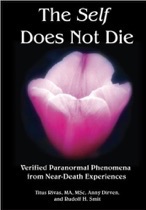 This book contains over 100 reliable, often firsthand accounts of perceptions during NDEs that were later verified as accurate by independent sources. These near-death experiencers were everyday people from all over the world — many of whom were clinically dead, unable to see or hear, and yet able to perceive new vistas of a world beyond the senses and even beyond death.
This book contains over 100 reliable, often firsthand accounts of perceptions during NDEs that were later verified as accurate by independent sources. These near-death experiencers were everyday people from all over the world — many of whom were clinically dead, unable to see or hear, and yet able to perceive new vistas of a world beyond the senses and even beyond death.
The Self Does Not Die is a trailblazing effort to present the most confirmed cases of consciousness beyond death ever compiled. In these cases, the authors have gone back to the original sources, the people involved in each case, whenever possible, rather than relying on secondhand sources. In so doing, they have assembled a unique collection of empirical data that any scholar worthy of the name must take into account.
By carefully studying and describing many convincing and corroborated cases, during cardiac arrest and other cases, the authors conclude that there are good reasons to assume that our consciousness does not always coincide with the functioning of our brain: Enhanced consciousness can sometimes be experienced separately from the body.
This book is a must read for anyone wanting to know more about this fascinating subject with its implications about the very nature of human consciousness and its survival of physical death. It has the potential to radically change the currently still widely accepted materialist paradigm in science.
…………..
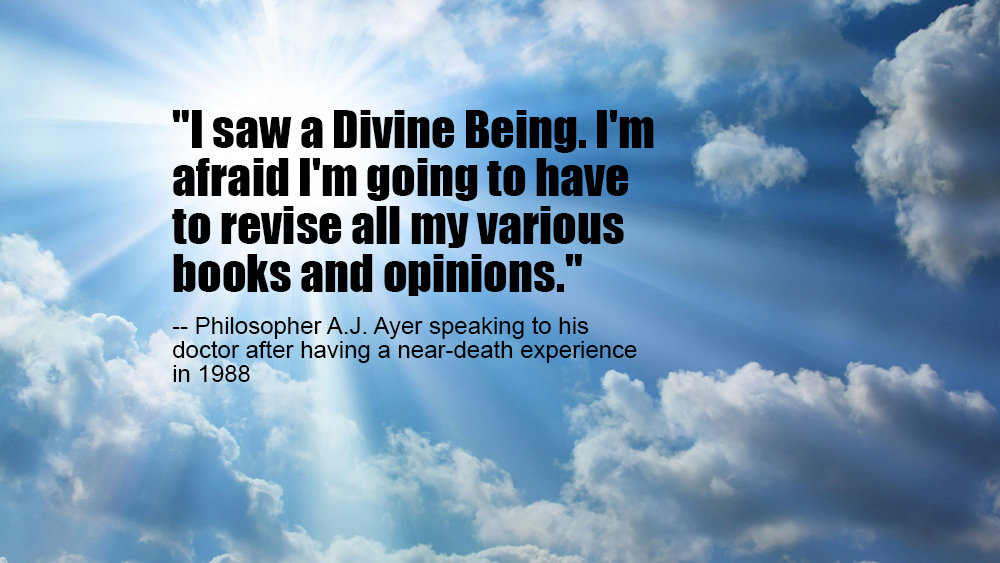
…………..
Atheist Neurologist Transformed by Near Death Experience
…………..
People Who Were Atheists Before An NDE Caused Them To Abandon Materialistic Worldviews
• Howard Storm
• Bettina Peyton
• Louisa Peck
• Nancy Rynes
• Tom Sawyer
• Barbara Harris Whitfield
• George Rodonaia
• Arthur Yensen
• Louisa Peck
• Beverly Brodsky
• Mellen-Thomas Benedict
• Ian McCormack
• Roger Ebert
• Yolaine Stout
• Dannion Brinkley
• Julie Aubier
• Ned Dougherty
• Louis Famoso
• Don Brubaker
• Joni Maggi
• Kerry Kirk
• Duane S
• Janet
• Joel
• Atheist NDE Accounts Listed on the NDERF Website
• Atheist NDE Accounts Listed on the IANDS Website
…………..
…………..
Excerpted from the book The Purpose of Life as Revealed by Near-Death Experiences from Around the World
Chapter 54 – Tell Her About The Light
By Louisa Peck
I remembered my near-death experience perfectly, including the bliss of love from The Light I encountered. I missed It terribly. At my core, I knew The Light was real — but I didn’t want to admit it. At the time, even after my NDE, I was an adamant atheist. Anybody who believed in God, or talked about God, just pissed me off. So I discounted my experience. “Get this,” I told one friend, “I had this crazy drug trip! It seems like I’m going into the sun!”
In other words, I was really good at denial!
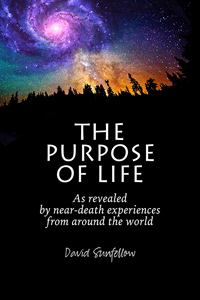 I was raised in a family that dismissed all spirituality as religion — and religion was an archaic way of explaining how the world worked. Now that science had unraveled evolution and biology, it was time to discard primitive beliefs in God, angels, and any related silliness like heaven. My understanding of the universe was simple: it was godless, mechanical, and utterly pointless.
I was raised in a family that dismissed all spirituality as religion — and religion was an archaic way of explaining how the world worked. Now that science had unraveled evolution and biology, it was time to discard primitive beliefs in God, angels, and any related silliness like heaven. My understanding of the universe was simple: it was godless, mechanical, and utterly pointless.
The home I grew up in was also an alcoholic home. In order to survive, I learned to compartmentalize facts I didn’t want to integrate into my life. I also became an alcoholic myself.
After my near-death experience, I stood at a crossroads. Either A) everything I had ever believed about a godless universe was wrong or B) I’d had a drug trip. I chose B. That way, I could continue the life I knew of drinking and chasing popularity.
So I locked my NDE away in a vault. I would have left it there except paranormal aftereffects started to happen to me. The greatest one was around my sister’s death.
She was dying from metastasized breast cancer. My family and I had been told that she had two weeks to live. During the night, as I tried to sleep in a chair, I sensed light — The Light — seeping in the window, traveling to my sister, and swirling in a slow vortex above her body. Each time I opened my eyes, I saw nothing. When I closed my eyes and tried to dismiss the feeling, it grew stronger.
Then a voice, which was connected to the sun I visited in my near-death experience, spoke to me. “She’s afraid,” It said. “Tell her about The Light!”
“What a silly thought!” I responded. “She’s not going to die now. She’s gonna live two more weeks!”
“Tell her,” the voice urged. Still hesitating, I was shown how my sister’s fear and hurt were blocking her from crossing over. I was also shown that I held the key to set her free.
“Go to her!” the voice urged. “Do it NOW!”
At last, I went. I knelt beside her, took her hand, and spoke into her ear. “God loves you so much,” I said. Remembering her love for Jesus, I added, “Jesus loves you so much. He’s so proud of all you’ve done on Earth. You’ve been a wonderful pianist, a scholar, and a loving mother. He’s so happy with everything you’ve done. But your body can’t work anymore. It’s time for you to come home. Jesus will take you with him. You’ll be so warm and the light will fill you with the most amazing love!”
The memory of my near-death experience filled my voice.
“I love you. We all love you.”
Twenty minutes later, my sister suffered a violent hemorrhage that sent my brother and I running for help. In a panic, I forgot all about The Light, all about the voice. “Help us! Help us!” Finally, a young doctor came and checked my sister. She briskly informed us, “Her heart is still beating, but it’ll stop when it runs out of oxygen.” Rage filled me. I wanted to scream, “How can you just let her die?!”
Then, all at once, I could feel my sister’s spirit. Her energy was hovering in the room. In life, her love had always felt a certain way, it had a certain flavor. I felt it strongly now. It replaced my anger with joy.
She told me, “I’m fine. I’m so wonderful!” Rejoicing, she filled me, my brother, even the doctor and nurse, with her love. She also filled me with The Light again, which reawakened in me memories of Its brilliance, so much so that I struggled to conceal my joy.
After a series of paranormal events like the one I had with my sister, the last pillar of my atheism toppled. It took 21 years for me to fully align with what I experienced during my near-death experience. In the end, two organizations saved the day: The International Association for Near-Death Studies (IANDS) and Alcoholics Anonymous (AA). These two organizations helped me reach the point where I could tell God that I loved It and promised I would never turn away again — and I haven’t.
My mission, I have come to understand, is to overcome the egoic challenges that all humans face. With humor and humility, we’re here to turn fear, anger, selfish greed and gloating pride into love and compassion for all life.
…………..
Related Quotes:
“When I died on the operating table in January of 2014, I died an atheist and skeptic. I did not believe in God, nor did I believe in any way that my consciousness would continue after the death of my physical body. I thought the Creator and the afterlife were both quaint stories, but just stories with no truth to them. But in an instant, God, Spirit, the Divine, or whatever you want to call that Supreme Entity, called me home and embraced me with a love so profound that it still makes me weep. Me, an atheist. I didn’t believe, yet He welcomed me back home.
“And He made it clear through my Guide that He loves ALL OF US. There is not one of us that He does not love. There is not one of us who is not part of His creation. And He asked me and you to love everyone as part of that creation, everyone, because we are all connected to each other through Divine Love and Presence.”
— NDEr Nancy Rynes
…………..
French Atheist NDE – I Could Hug My Baby Daughter In Heaven
…………..
Experiences of ‘Ultimate Reality’ or ‘God’ Confer Lasting Benefits to Mental Health
“In a survey of thousands of people who reported having experienced personal encounters with God, Johns Hopkins researchers report that more than two-thirds of self-identified atheists shed that label after their encounter, regardless of whether it was spontaneous or while taking a psychedelic.”
…………..
“I saw a Divine Being. I’m afraid I’m going to have to revise all my various books and opinions.”
— Philosopher A.J. Ayer speaking to his doctor after having a near-death experience in 1988
…………..
“The first gulp from the glass of natural sciences will turn you into an atheist, but at the bottom of the glass God is waiting for you.”
— Werner Heisenberg (1901 – 1976), Nobel Prize in Physics 1932
…………..
Question: “Do you believe in God?”
Carl Jung: “I know. I don’t need to believe. I know.”
— Carl Jung, Face To Face with Carl Gustav Jung (1959)
…………..
Stephen C. Meyer – Buddha At The Gas Pump Interview
…………..

